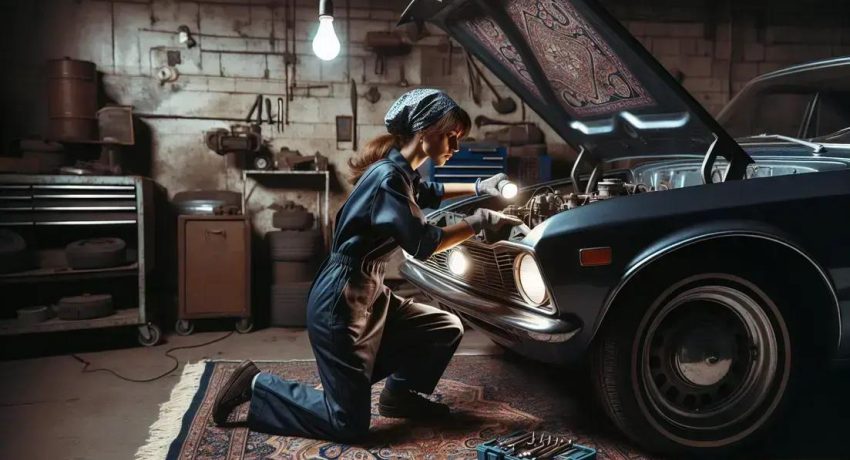To fix a car that won’t start, check the battery, fuel system, ignition components, and fuses, as these are the most common issues responsible for starting failures.
How to fix car won’t start is a common dilemma many drivers face. Perhaps it’s that frustrating moment when the engine just won’t turn over. Let’s explore some effective troubleshooting tips.
Table of Contents
ToggleIdentifying potential issues when your car won’t start

When faced with a situation where your car won’t start, it’s important to identify the potential issues quickly. Start by checking the battery. A dead battery is one of the most common reasons for a car not starting. Look for signs like dim headlights or clicking noises when you turn the key. If your battery is old or has corrosion on the terminals, it might need replacing.
Inspecting the Fuel System
Another area to consider is the fuel system, as lack of fuel can also prevent the engine from starting. Make sure there’s enough gasoline in the tank, and check for any fuel leaks that may be visible under the car.
Examining the Starter
The starter motor is another critical component. If it’s malfunctioning, you may hear a clicking sound or none at all when you attempt to start the car. Testing the starter can help determine if it needs replacement.
Checking the Ignition System
Don’t forget about the ignition system. Worn spark plugs or issues with the ignition coil can prevent your car from starting. Replacing spark plugs as part of regular maintenance can save you this headache.
It’s also wise to inspect the fuses. A blown fuse can affect various electrical components, including the starter and ignition systems. A quick visual check can help you assess their condition.
In some cases, the issue may not be mechanical but electrical. Look for any dashboard warning lights or error codes that could assist in diagnosing the problem more specifically.
Steps to troubleshoot a car that won’t start

Troubleshooting a car that won’t start can be a straightforward process if you break it down into clear steps. Start by ensuring the car is in park or neutral before turning the key, as this is essential for automatic transmissions.
Step 1: Check the Battery
Begin your troubleshooting by checking the battery. Look for any signs of corrosion on the terminals and ensure everything is connected tightly. If you have a multimeter, test the battery voltage. A reading below 12.6 volts usually indicates the need for a charge or replacement.
Step 2: Listen for Sounds
Next, listen for any sounds when you attempt to start the engine. If you hear a clicking noise, this often points to a weak battery or an issue with the starter motor. If you hear nothing at all, it could indicate a more severe electrical problem.
Step 3: Test the Fuel Supply
Make sure that there is sufficient fuel in the tank. Sometimes it can be as simple as running out of gas. If the fuel level is fine, consider checking the fuel pump and fuel filters, as a malfunctioning pump can prevent fuel from reaching the engine.
Step 4: Examine the Ignition Components
Look at the ignition system next. Worn-out spark plugs can make it difficult for your engine to start. Check for any signs of wear and replace them if necessary. Additionally, inspect the ignition coil to ensure it’s working properly.
Step 5: Inspect the Fuses
Check under the dashboard for any blown fuses. A blown fuse can affect multiple electrical components, leading to starting issues. Replacing any faulty fuses can be a quick fix.
By following these straightforward steps, you can effectively troubleshoot a car that won’t start, saving time and possibly costly repairs.
In summary, troubleshooting your car when it won’t start
Understanding how to troubleshoot a car that won’t start can save you time and money. By checking the battery, fuel, ignition, and electrical systems, you can pinpoint the issue effectively. These steps can help you identify common problems quickly.
Regular maintenance and inspections can also prevent many starting issues before they happen. Always stay proactive with your vehicle care. If you follow these tips and still have trouble, it might be best to consult a professional mechanic for further assistance.
FAQ – Frequently Asked Questions about Troubleshooting a Car that Won’t Start
What should I do first if my car won’t start?
Start by checking the battery and ensuring it has a good charge and that the terminals are clean and securely connected.
How can I tell if my fuel pump is working?
You can listen for a humming sound from the fuel tank when you turn the key to the ‘on’ position, which indicates the fuel pump is running.
What signs indicate that the starter might be bad?
If you hear a clicking noise or nothing at all when turning the key, it may suggest an issue with the starter.
Why is it important to check the ignition system?
The ignition system is crucial for starting the engine; worn spark plugs or coils can cause starting issues, so checking them is essential.
Can blown fuses affect my car’s ability to start?
Yes, blown fuses can disable important electrical components, including the ignition and starter circuits, preventing the car from starting.
When should I consult a mechanic for starting issues?
If you’ve followed troubleshooting steps and the car still won’t start, it’s best to consult a mechanic for a thorough diagnosis.






